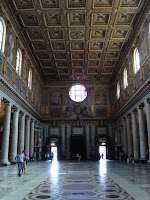 What a day! Starting out outside St. Maria Maggiore (picture 1) looking for another Vatican post box - an unsuccessful quest - we continued into the Basilica. This is an impressive church (picture 2) with lots of little chapels, one of them open for adoration. Building started in 432
What a day! Starting out outside St. Maria Maggiore (picture 1) looking for another Vatican post box - an unsuccessful quest - we continued into the Basilica. This is an impressive church (picture 2) with lots of little chapels, one of them open for adoration. Building started in 432 
A.D. after God had spoken to the Pope in a dream - in the dream it was snowing on one of the hills of Rome and God told him to build a church there and the city would be rid of the plague that had ravaged it. For this reason the church is also known as Mary of the Snows.
This, the last of the main basilicas, is also one of the seven pilgrim churches. For nearly 700 years this was the seat of the latin patriarch of Antioch - up until 1953 when the last one died and no new one was appointed.
 Moving on outside the walls - to San Paolo fuori le Mura (St. Paul's Without the Walls) - the last of the Pilgrimage Churches - we prayed for the Pope's intentions and then went on looking around. This church (picture 3) is absolutely huge and built on the location where St. Paul was buried, his sarcophagus partially displayed in the crypt (picture 4 - and yes, that is a bit of yours truly in the bottom left hand corner there). The church was first built in 386 A.D. but burnt down in 1823 A.D. and has hence been reconstructed and only parts of the antique basilica remain.
Moving on outside the walls - to San Paolo fuori le Mura (St. Paul's Without the Walls) - the last of the Pilgrimage Churches - we prayed for the Pope's intentions and then went on looking around. This church (picture 3) is absolutely huge and built on the location where St. Paul was buried, his sarcophagus partially displayed in the crypt (picture 4 - and yes, that is a bit of yours truly in the bottom left hand corner there). The church was first built in 386 A.D. but burnt down in 1823 A.D. and has hence been reconstructed and only parts of the antique basilica remain.
In connections to this church is also a monastery which is, I'm sure, lovely to visit - despite repeated visits to the church I still haven't managed it - there is so much to see here! So after praying, visiting the crypt, carefully examining the wall with the Pope portraits and discussing which ones were sodalists and photographing a group of nuns when they were looking the other way we took a break in the cafeteria - a very good one, by the way, a great place to relax before going on to the next stop. In St. Paul's there's also a very nice gift shop where they sell, apart from the usual rosary beads and little statuettes, soaps, candy and oils (oh - and liqueur, too!) made by the monks.
After this visit it was time for what would end up being my

favourite part of the pilgrimage (even though San Sebastiano comes close, too). The church of St. Agnes without the walls (OK, I might be slightly biased my own name being Agnes...). Yes, it is a bit away from the city center - and a bit of a walk from the nearest bus stop - but just opening the doors to this masterpiece of a church made it all feel worth it. After entering the doors you need to the descend a long flight of stairs with beautifully ornamented walls and ceilings (picture 5).
The church that's on the site today was built in the 7th century but there's been a church here longer than that. It is in this church that two lambs are blessed by the Pope on St. Agnes' Feast Day (Jan 21 for those of you who don't keep track), their wool later woven into pallia - the ceremonial white neck-stoles sent to newly elevated Metropolitan archbishops, the church is also another place where you can visit the catacombs of Rome.
After this visit we could go home happy.

Well, apart from the obvious boon of the plenary indulgence just seeing these churches - and very large bits of Rome as you jet back and forth through the city - was an absolutely marvellous experience. The different architectural styles, the artwork, the endless lines of pilgrims and, I admit, the lovely little souvenir shops, makes one realise how huge the church is; geographically and chronologically!
ReplyDelete